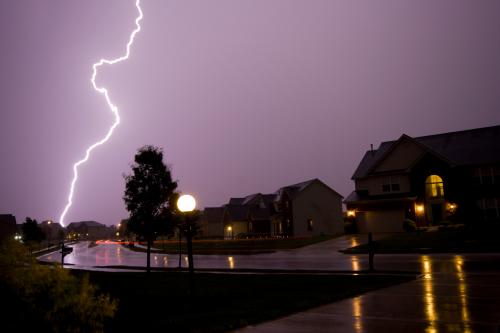Surge protection
Since we live in a state that experiences lots of thunderstorms in the spring and summer, it's important that we protect our home and appliances while we're experiencing these unpredictable weather systems. Power surges occur when the flow of electricity is interrupted, then started again, or when something sends electricity flowing back into the system. This happens most often during thunderstorms when cloud-to-ground lightning strikes choose power lines as the easiest path to transfer energy from the storm clouds to the ground. Though it doesn't happen often, there can still be a significant surge risk if lightning strikes near your home and decides to use your appliances as part of its easy path to ground.
A whole house surge protector is a surge protector that is hard-wired to your electrical box/panel. Whole house surge protectors should be installed by a professional and typically takes about two hours. This device limits excess electrical current by blocking its flow or shorting it to the ground. It helps protect against lighting but also surges that occur within your home from major appliances.
An outlet surge protector can help prevent voltage spikes from entering the specific items plugged into this outlet. These are used quite often in homes as a way to protect computers or major appliances.
No. Put simply, power strips are an expansion of a wall outlet that allows you to plug many items into the outlet. These usually have a circuit breaker (on/off switch) of some sort, but most don't offer any real protection from electrical issues. -Think of it more like an extension cord.
The easiest way to prevent damage caused by a power surge is to unplug devices that aren't being used. If something isn't plugged into an outlet, it can't experience a surge.
If you have an older home, you may want to consider upgrading your wiring. Homes built before the 1980s weren't designed to handle large-capacity refrigerators, entertainment systems and computer equipment. If you're experiencing frequently blown fuses or tripped circuit breaks, you may want to check into this. If you're building a new home, be sure to ask your electrician to establish dedicated circuits for larger appliances or to divide rooms with multiple devices into separate circuits.

